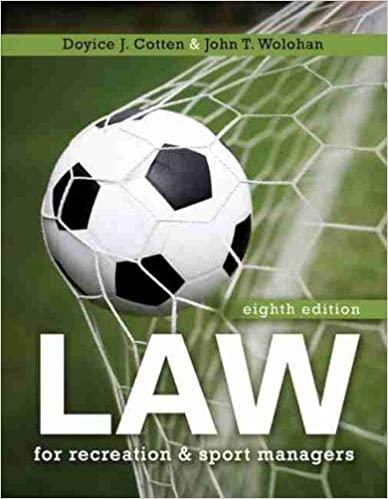Question
True/False Questions 1) A prenuptial agreement takes effect before marriage. Answer: 2) Parties can draft and sign a prenuptial agreement without attorney involvement. Answer: 3)
True/False Questions 1) A prenuptial agreement takes effect before marriage. Answer: 2) Parties can draft and sign a prenuptial agreement without attorney involvement. Answer: 3) Usually, covenant marriage spouses can divorce only after a two-year separation. Answer: 4) To qualify as common law married, the couple has to continuously cohabit as common law spouses for at least a year. Answer: 5) Vermont became the first state to recognize same-sex marriage. Answer: 6) California's domestic partners law is a variation of the laws regarding civil union. Answer: 7) Lack of marital intent is a ground for annulment. Answer: 8) At common law, the marriage of a girl under 12 was voidable. Answer 9) A legal separation formalizes the disintegration of the legal union. Answer: 10) A legal separation is impossible if the couple have minor children. Answer
11) Colorado was the first state to enact no-fault divorce in 1970. Answer: 12) If divorcing spouses have a prenuptial agreement, they may avoid the effects of community property laws. Answer: 13) Mental suffering that impairs the spouse's health can be a ground for divorce. Answer: 14) In many states, nonsupport is available only to the wife as a ground for divorce. Answer: 15) In all states, a felony conviction is a ground for divorce. Answer: 1) What term is used to describe the person against whom the divorce was sought? A) Libelant B) Libelee C) Appellant D) Appellee Answer 2) What term describes the written answer filed by a respondent? A) Answer B) Response C) Petition D) Motion Answer: 3) What is an initial pleading in a divorce action? A) Libel
B) Complaint for divorce C) Complaint for dissolution D) All of the above Answer: 4) What is a judgment nisi? A) Court's provisional decision B) Court's final decision C) Decision of a court of equity D) Summary judgment Answer: 5) What is a person's permanent place of abode? A) Dwelling place B) Residence C) Domicile D) Habitation Answer: 6) What state requires the plaintiff in a divorce action to reside in the state for a minimum time before filing for divorce? A) Alaska B) South Dakota C) Nevada D) Washington Answer: 7) What term describes another state or country? A) Alien jurisdiction B) Foreign jurisdiction C) All of the above
D) None of the above Answer: 8) What term describes a divorce occurred when both parties file an appearance in a foreign state? A) Bilateral foreign B) Mutual foreign C) Joint foreign D) Common foreign Answer: 9) What clause of the U.S. Constitution is the legal foundation for the recognition of a foreign divorce as valid? A) Due process B) Full faith and credit C) Privileges and immunities D) Equal protection Answer: 10) Under what circumstances may an ex parte foreign divorce be attacked by a spouse who did not appear? A) Spouse brings suit for separate support B) Spouse dies and the other spouse claims an inheritance C) All of the above D) None of the above Answer: 11) What is a traditional defense to a divorce action? A) Collusion B) Comity
C) Chose in action D) Chattels Answer: 12) What term describes the plaintiff's secret cooperation in the commission of a marital wrong committed by the defendant? A) Criminal conversation B) Connivance C) Alienation of affection D) All of the above Answer: 13) What doctrine states that neither party could obtain a divorce when both are guilty of a marital wrong? A) Fruit of the poisonous tree B) Cy pres C) Recrimination D) Respondeat superior Answer: 14) What term describes an allowance made to a divorced spouse by a former spouse for support? A) Alimony B) Spousal support C) All of the above D) None of the above Answer: 15) What issues are considered by courts in determining the amount of alimony? A) Earning capacity B) Financial resources
C) Future prospects D) All of the above Answer 16) What laws give courts the power to distribute property fairly between the parties upon divorce? A) Equitable distribution B) Fair distribution C) Reasonable distribution D) Just distribution Answer: 17) What is the legal basis for the court's power to award alimony? A) Common law B) Statutes C) International law D) Universal Declaration of Human Rights Answer: 18) What term describes parents' legal obligations to contribute to the economic maintenance and education of their children? A) Child support B) Maintenance C) All of the above D) None of the above Answer: 19) What custody may be awarded to a parent before a divorce is finalized? A) Temporary B) Provisional C) Transitory D) Conditional
Answer 20) What issue is considered by courts in determining who will have custody of a child? A) Physical safety of the child B) Economic needs of the child C) Child's wishes D) All of the above
Step by Step Solution
There are 3 Steps involved in it
Step: 1

Get Instant Access to Expert-Tailored Solutions
See step-by-step solutions with expert insights and AI powered tools for academic success
Step: 2

Step: 3

Ace Your Homework with AI
Get the answers you need in no time with our AI-driven, step-by-step assistance
Get Started


